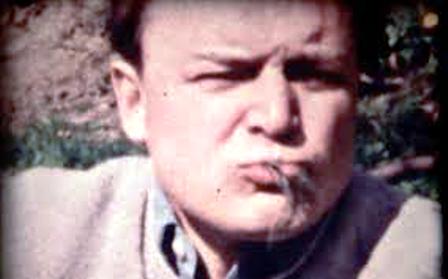


Lucie Králová: Kapr Code

Love that film! Because of its surprising, fresh approach to its protagonist Jan Kapr (1914-1988), a composer unknown to me. Until now, at least I know a lot about him, as a text in the beginning of the film indicates: “Sometimes, we can follow only traces full of dissonance and missing pieces”. Which is what Lucie Králová does in her “Documentary Opera”, that is full of life and storytelling twists as Jan Kapr’s life was full of surprising changes from being a loyal communist composing for the state to being – after the Soviet invasion in 1968 – a persona non grata, when he left the Party. He, Laureate of the Stalin and Smetana Award.
Opera… it is an amazing scoop to follow a choir in a studio interpreting and performing Kapr’s compositions in a playful way with an original libretto written by Jiří Adámek. Full of humour it is, an obvious choice as Kapr was a man who loved to play and experiment. He wanted to be an elite gymnast but had a severe accident that crippled him, so he turned to music.
Again and again Králová returns to footage of Kapr falling from a sled in the snow and again and again Kapr is seen swimming in a lake surrounded by beautiful mountains and a cottage, where he apparently spent a lot of time with friends and family.
Because Kapr was a filmmaker as well. Králová combines cleverly the studio recordings with his home video’s (super 8mm digitized), refraining from making another conventional biographical film. And yet the needed and very interesting information about his life is conveyed brilliantly with a twinkle in the eye. Like the stats given, what Kapr left: 12 kilos of letters (!), 7 mins of Fall (in the snow) footage, 112 minutes of material with Libuska…
Libuska was his second wife with whom he had Magda, who appears briefly in the film looking at footage of Vlasta, his first wife and Alenka their daughter, the sister with whom Magda had connection, whereas she (Magda) never heard about her brother Milos, who was placed in an institution by Vlasta and Jan – the footage shows that there was something wrong with him.
Kadr’s films show happy moments and meetings. With Dvorsky, a Czekoslovak musician, who Kadr helped to get out of the hands of the communist regime, and Pavel Ludikar, a world famous opera singer, who came to visit.
Anyway, the film keeps on coming back to the face of Kadr: The smiling man, posing for the camera, head over water with daffodils in his mouth… everyone must have loved this man. The filmmaker does and she found her way to tell us, innovative and full of joy. Result: Excellent film!
Czech Republic, Slovakia, 91 mins.